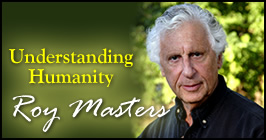By Roy Masters
Author of "Hypnotic States of Americans"
October 28, 2013
NewsWithViews.com
Familiarity Breeding Contempt
Being “loved” brings out the beast in you.
Then your loving partner finds out what you are like, and for a little while he makes use of your beastliness. When “love” raises your base self into the light of contempt, you no longer enjoy the place of esteem you once had. But needing that “love” more than ever, you feel the urge to impress others, while neglecting your first “love.” Down and down you fall, getting the respect that made you more unrespectable.
Your children watch your agony and ecstasy.
Smoking, drinking yourself under the table, playing around with “playmates”—again and again. To avoid the guilt of judgment, you try to believe that it is the children who are the wrong ones. Sometimes, to avoid the guilt of hating you, they try to see you as good. But either way, illusioned or disillusioned, loving or hating you, they are headed in the same direction.
All is not well with mankind. We are anxious because we simply are not what we should be. The first hint of this is the anxiety over waste elimination; later on food, sex, disease and death.
Some people turn on the tap when they go to the toilet, feeling embarrassed that others might overhear their efforts and thereafter see them in a different light—as animals who wee-wee instead of immortal princes. In contrast, there are others who would proudly display their animal equipment in full view of the multitudes. The shock of embarrassing people has the effect of relieving their own secret embarrassment or guilt.
Remember How It Was?
Think back to when you were a small child ...
Remember your reaction, watching adults enjoying their repasts? Did you ever feel that for some strange reason they looked silly, greedy and undignified, somehow too big to be eating? When you grew up, there came that vague feeling again. But this time it was you who was being watched.
Reflect back to your first dinner date ...
Do you recall the shyness and embarrassment you experienced, as though eating were strangely undignified and unbecoming? Did you lose your appetite or glance fearfully out of the corners of your eyes, hoping to see your someone enjoying his food so much that he was not noticing your awkwardness?
And what did you see? People eating and drinking with the savoir-faire of acrobats! Feeling more confident, you then lost that “silly” uneasiness and shyness—and tucked in! And so a situation like this was the place you first learned to use food as a means of escaping anxiety.
Sometimes lovers lose their appetites in each other’s presence because feeling godly with another can sometimes be “food” enough. Often they are too busy devouring each other.
Whether you are aware of it or not, everyone has the same problem with food—and sex, too! Some people are more aggressive, and as potential pacesetters are quick to take the initiative; they sense the need of others, so they put on a front and pretend to feel no embarrassment. They do so hoping that others will follow their lead, and help them to overcome the embarrassment they pretend not to have.
That is usually why you get hungry watching others eat, because at one time or another you have used someone who needed to enjoy food to help you get over embarrassment. It may have originated with mama’s anxiety for you to eat for her own relief. This same principle applies to just about every vice you have.
Think of the implications. You can never really have a normal appetite for anything; you will always feel an inhibition, caused when you sense that appetites are promoted and used by others for their own satisfactions. You will never be able to prevent people from arousing and using you; neither can you resist the “charm” of using them. When you do use them, you will accumulate anxiety that you will discover when you stop using them for an instant, or when you try to give them up, which in turn drives you to use-love them more.
Weaknesses Attract the Vultures
Think of the numerous ways this conditioning is exploited: newspapers, TV and radio media, magazines, books, films, advertising, pornography, politics, etc. Through highly sophisticated practices of arousing weaknesses and assuring them, people are dehumanized for profit.
Remember, too, that whatever object is associated with a temptress creates an equivalent hunger for the object associated with her. But you will never discover this trick as long as you keep buying the sex object and gratifying your promoted needs with “her.”
Again, see the principle. Guilt and passion increase whenever you try to see normality in your present hunger!
Once caught up in this cycle, you eat, drink or copulate without ever finding complete satisfaction. You acquire many vices, under which are buried the original embarrassment. Each cure becomes the next problem that needs curing. And a profiteer leads the way, who specializes in making your base needs acceptable to you.
When our natural senses reach a point of diminishing return—when they make us more guilty and anxious and then make us “innocent”—at this point we can be initiated into the world of drugs and drink. “A “friend” usually appears on the scene, offering us a “free” drink, pill or cigarette.
Obviously he does not make this gesture out of the goodness of his heart, but out of an overriding compulsion to tempt you, to make himself feel comfortable in his perversions, even as he has been tempted and used by others. The moment you join him, he is freed from the embarrassment of smoking or drinking, which themselves cover the embarrassment of a multitude of sins. He needs you to be like him!
But your own unhappiness has made you ready for what he offers. Anything you use to escape anxiety causes a hang-up with it, then a guilt over it and a need to use it again, or something even “better.” Trace it all back to the basic practice of escaping each present moment.
The principle, you see, is the same for cigarettes and drugs as it is for eating and sex and wrong living, all of which lead you to the abyss. For example, once you begin smoking, you are more guilty for using the smoke to escape whatever you are hiding behind the smokescreen. Now you have got to smoke, simply to prevent that anxiety from emerging. But soon you have the anxiety of smoking to deal with, as well.
When your fingers reach for that cigarette or bottle, it’s a sign that the Inner Presence is making you aware and anxious. So you smoke to forget the guilt of smoking, or drink to blot out the anxiety of drinking. There develops a whole chain of evasions, beginning with emotion, then eating, sex, and so on—but especially emotion.
| Subscribe to the NewsWithViews Daily News Alerts! |
Anger, resentment, fear and “love” ...
Anger makes you reach for a cigarette or drink—but so do “love” and happiness. You drink to celebrate, because whatever it was that made you “happy” built up your ego and went to your swollen head, and you were guilty of the “high” of happiness. You reach for a cigarette after a “hearty.” meal and some sex after that, then a fight after that, followed by a drink, more fighting, more sex.... And then what?
[A special form of emotional self-control is the key to relating properly to yourself and to the world. Your very life depends on your responding in a right way to what is wrong with you, so that it cannot get or remain inside and rip you apart. To put up an invisible, impenetrable force shield of calm patience around you, you must learn to deal properly, without resentment, to pressures of any kind, whether from within or without. The audio exercises on my new credit-card-sized Cure Stress Device audio player show you how to do this and help you practice remaining in the proper state. To get your own Cure Stress Device, CLICK HERE, ]
Listen to Roy Masters LIVE call in radio show Monday to Friday from 9 PM to 11 PM Pacific on KDWN Radio in Las Vegas, NV.
© 2013 Roy Masters - All Rights Reserved
Roy Masters who in his 80s continues to broadcast the longest-running counseling show in talk radio history, his internationally syndicated daily radio program Advice Line, grew up in pre-WWII England. He started his journey toward understanding human nature when as a teen he saw a stage hypnotist at a vaudeville show in Brighton. The hypnotist easily put volunteer subjects in a spell and made them do outlandish things, like dancing with a broom and forgetting their own names.
Puzzled by the hypnotist's mysterious power, Roy distinctly remembers pondering the question: "Why can't hypnotism be used to make people act sensibly, rather than foolishly?" Inspired by the idea of harnessing this baffling force for good, he later pursued the art of hypnotism and established a successful hypnotherapy practice.
After several years of practice, Masters made his central and pivotal discovery about the root of people's emotional problems, addictions and complexes. He realized that people did not need hypnosis, because their core problem was that they are already hypnotized not by a clever stage performer, but by the stresses, pressures and seductions of daily life.
He used his knowledge to discover a way to help us become de-hypnotized, and discovered that the root of the power of negative suggestion lay in our wrong emotional response, that of resentment. Masters' remarkably effective exercise, a simple observation technique called Be Still and Know is at the core of his unmatched track record in helping people overcome even the most serious mental-emotional problems, and is the centerpiece of a successful program within the U.S. military community (Patriot Outreach) that is helping thousands of military personnel and their families cope with post-traumatic stress disorder (PTSD).
1-
Website: www.fhu.com
2-
Website: FixAnxiety.org














 Share
This Article
Share
This Article




